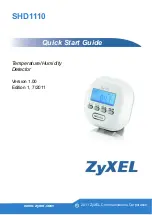
7. GLOSSARY AND ACRONYMS
tablish and maintain Internet protocol connec-
tions across gateways that implement network
address translation (
NTP
Network Time Protocol (NTP) is a net-
working protocol for clock synchronization be-
tween computer systems over packet-switched,
variable-latency data networks.
OpenVPN
OpenVPN implements virtual pri-
vate network (
) techniques for creating se-
cure point-to-point or site-to-site connections. It
is possible to create four different tunnels.
PAT
Port and Address Translation (PAT) or Net-
work Address Port Translation (NAPT) see
Port
In computer networking, a Port is an
application-specific or process-specific software
construct serving as a communications endpoint
in a computer’s host operating system. A port is
associated with an IP address of the host, as
well as the type of protocol used for communi-
cation. The purpose of ports is to uniquely iden-
tify different applications or processes running
on a single computer and thereby enable them
to share a single physical connection to a packet-
switched network like the Internet.
PPTP
The Point-to-Point Tunneling Protocol
(PPTP) is a tunneling protocol that operates at
the Data Link Layer (Layer 2) of the OSI Ref-
erence Model. PPTP is a proprietary technique
that encapsulates Point-to-Point Protocol (PPP)
frames in Internet Protocol (IP) packets using
the Generic Routing Encapsulation (
) pro-
tocol. Packet filters provide access control, end-
to-end and server-to-server.
RADIUS
Remote Authentication Dial-In User
Service (RADIUS) is a networking protocol that
provides centralized Authentication, Authoriza-
tion, and Accounting (AAA or Triple A) manage-
ment for users who connect and use a network
service. Because of the broad support and the
ubiquitous nature of the RADIUS protocol, it is
often used by ISPs and enterprises to manage
access to the Internet or internal networks, wire-
less networks, and integrated e-mail services.
Root certificate
In cryptography and com-
puter security, a root certificate is either an un-
signed public key certificate or a self-signed cer-
tificate that identifies the Root Certificate Author-
ity (CA). A root certificate is part of a public key
infrastructure scheme. The most common com-
mercial variety is based on the ITU-T X.509 stan-
dard, which normally includes a digital signature
from a certificate authority (CA).
Digital certificates are verified using a chain of
trust. The trust anchor for the digital certificate is
the Root Certificate Authority (CA). See
Router
A router is a device that forwards data
packets between computer networks, creating
an overlay internetwork. A router is connected
to two or more data lines from different net-
works. When a data packet comes in one of the
lines, the router reads the address information
in the packet to determine its ultimate destina-
tion. Then, using information in its routing ta-
ble or routing policy, it directs the packet to the
next network on its journey. Routers perform the
traffic directing
functions on the Internet. A data
packet is typically forwarded from one router to
another through the networks that constitute the
internetwork until it reaches its destination node.
SFTP
Secure File Transfer Protocol (SFTP) is
a secure version of File Transfer Protocol (FTP),
which facilitates data access and data transfer
over a Secure Shell (SSH) data stream. It is part
of the
Protocol. This term is also known as
SSH File Transfer Protocol.
SMTP
The SMTP (Simple Mail Transfer Proto-
col) is a standard e-mail protocol on the Internet
and part of the TCP/IP protocol suite, as defined
by IETF RFC 2821. SMTP defines the message
format and the message transfer agent (MTA),
which stores and forwards the mail. SMTP by de-
122
Summary of Contents for B+B SmartWorx LR77 v2
Page 1: ...Configuration Manual for v2 Routers ...
Page 18: ...2 STATUS WiFi Scan output may look like this Figure 4 WiFi Scan 11 ...
Page 29: ...3 CONFIGURATION Figure 12 Example 1 LAN Configuration Page 22 ...
Page 34: ...3 CONFIGURATION Figure 19 Example of VRRP configuration backup router 27 ...
Page 42: ...3 CONFIGURATION Figure 20 Mobile WAN Configuration 35 ...
Page 50: ...3 CONFIGURATION Figure 24 WiFi Configuration 43 ...
Page 75: ...3 CONFIGURATION Figure 36 IPsec Tunnels Configuration 68 ...
Page 105: ...3 CONFIGURATION Figure 54 Expansion Port Configuration 98 ...
Page 110: ...3 CONFIGURATION Figure 59 Example 2 USB port configuration 103 ...







































